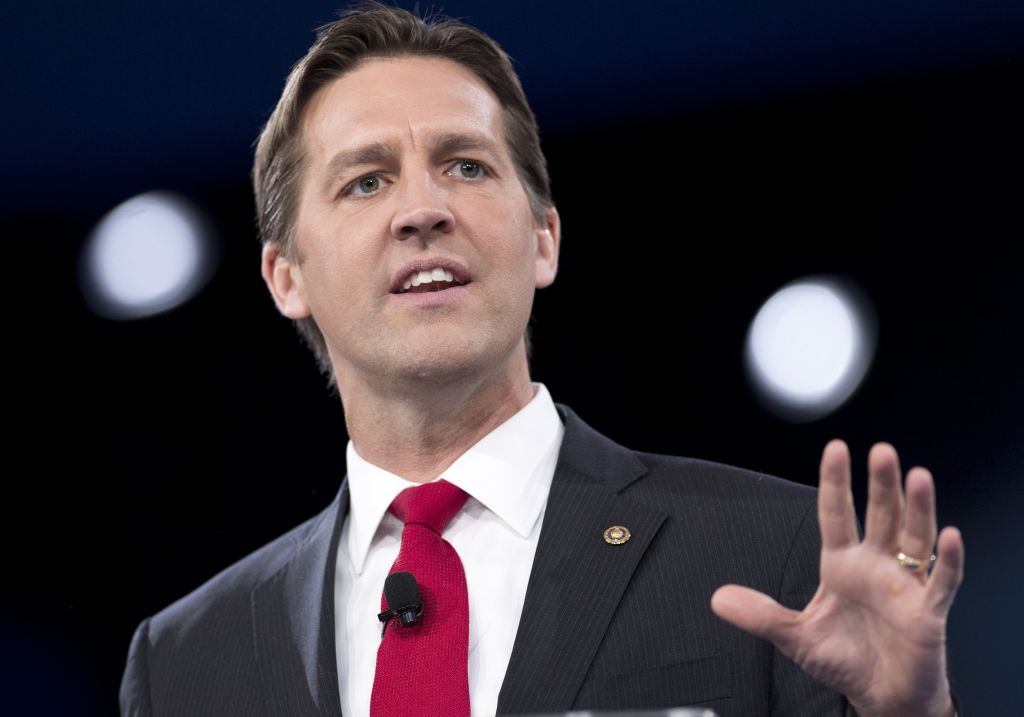Ben Sasse’s late 2022 announcement that he was leaving the Senate to become president of the University of Florida presented an opportunity to have a far-reaching conversation about American post-secondary education. Sasse’s atypical background for a leader of a major public university—national public official, management consultant, Ph.D. historian, small-college president, right-of-center politics—could’ve catalyzed discussions about countless reform subjects. Unfortunately, much of the reporting and commentary centered on what his Senate departure said about Donald Trump, the Republican Party, and Washington, D.C. Follow-up coverage largely focused on subsequent student protests and demands.
The episode was a microcosm of the dysfunction of public discourse today. So many issues are begging for serious deliberation and concerted action, but instead we see them as battles. To the extent we discuss public policy or institutional reform, we tend to reduce a complex subject to its most radioactive elements so it holds our attention.
You can only understand Sasse’s career move if you appreciate that the policy and practice of higher education reform stretches miles beyond protesters shouting down speakers and Uncle Sam forgiving hundreds of billions in loans. At this moment post-secondary education may be the most interesting, if not the most important, area of American domestic policy.
For years, a top priority for education advocates was dramatically increasing the number of students attending college. This was sensible. A college degree is associated with higher lifetime earnings, a lower likelihood of unemployment, and much more. The jobs of the future, it was also argued, demanded post-secondary schooling. Also, low-income, black, and Latino students were less likely to earn degrees, so a national college-for-all movement had the promise of advancing equal opportunity.
The good news is that America made progress: The number of Americans with a bachelor’s degree or above rose, and more historically disadvantaged students were engaged in higher education. But problems emerged. The cost of college grew and grew, student debt skyrocketed, millions of students attended but never graduated, a college degree wasn’t really needed for many jobs, the financial return on a degree fell, and more Americans doubted that a college education was worth it. Public confidence in these institutions also fell. Because of such issues—and thanks to demographic factors that reduced the number of traditionally college aged individuals—college enrollment has been falling for more than a decade. And that enrollment slide might not be over: Not only are we on the cusp of the long-coming “enrollment cliff,” the educational after-effects of the pandemic are still not fully known, and a growing number of states have ended the degree requirement for some government jobs (a trend also seen in the private sector).
We should take this seriously. American higher education is invaluable. U.S. colleges and universities conduct essential research and educate millions of students annually. Although much media attention and philanthropy flows to nationally focused elite private schools (which educate less than 1 percent of undergraduates), it is difficult to overstate the importance of public flagships and regionally focused schools. They contribute mightily to state and local economies and civil-society sectors; train teachers, doctors, and judges; and enable millions of students to advance their education while tending to family and community obligations. America needs strong institutions of higher education.
There are at least three big questions that can get lost in the din of noisier issues. First, how many students should four-year colleges and universities serve? There is appeal to the answer, “as many as possible;” indeed, opportunity should be expansive and equal. But not all high school graduates are prepared for college, many don’t want to attend college, many good jobs don’t require a degree, and students suffer costs (time, effort, debt) if college isn’t the right path. High school students can be introduced to career-and-technical training programs that pave a path directly into the workforce, and there are literally thousands of post-secondary credentials apart from four-year degrees (e.g. associate degrees, industry certifications, licenses, badges, apprenticeships). This means state leaders need to understand four-year schools as one part of an ecosystem that also includes community colleges, technical schools, and a whole host of private providers, which raises numerous questions. Should four-year schools get more involved in credentials other than bachelor’s degrees and prioritize “reskilling,” or leave such work to others? Should more philanthropic, state, and federal aid support students who pursue non-four-year options? Answers to these questions could reshape which academic programs schools approve, how state governments distribute aid, the types of faculty and staff that will be hired, and much more.
Second, how do we maintain stability while fostering dynamism in the higher education sector? Regardless of the field, bold reformers tend to underestimate the value of preserving existing institutions and practices. But today’s higher ed sector, having evolved over generations, accomplishes a great deal for society, often quietly. It conducts pure and applied research; businesses, nonprofits, and government entities rely on it for countless functions; and the traditional four-year, in-person, campus model works exceptionally well for many students. Overhauling the system or promoting “creative destruction” would come with significant costs. Indeed, when colleges close–whether small secular privates, HBCUs, faith–based schools, or liberal arts schools–underserved communities and geographies can suffer, history can be lost, and institutional diversity can be reduced.
But some innovation is in order. Other fields and industries benefit from new entrants and “skunk works” projects, so a higher ed “new-schools strategy” could pay dividends (though founding institutions of higher learning is no easy task). Likewise, while remote and tech-enabled learning hasn’t revolutionized K-12 or higher ed as some thought, it can be used to reach more students, especially the growing number of non-traditional students, and deliver certain types of instruction (e.g., customized tutoring, introductory courses). Those wanting to innovate in higher ed need to appreciate, however, that new offerings, new providers, new types of financing models, and new instructional modalities likely necessitate new approaches to accreditation, oversight, funding formulas, program approval, and more. That is tough work.
Third, how do we assess whether institutions are helping students? It is always difficult to measure the effectiveness of complex systems. Trying to capture their contributions with narrow indicators can distort the system. GDP does not tell us everything we need to know about an economy’s health, and reading scores do not tell us everything we need to know about an elementary school’s success. If interventions and accountability are focused exclusively on increasing GDP or reading proficiency, we can warp practitioners’ priorities, misinvest resources, and devalue other important outcomes. So we should be cautious of the current movement to judge success based on students’ later earnings. Future income is an important indicator, but there is much more to higher education. Our nation will suffer if we allow the humanities to continue disappearing because technical fields promise greater income. Our nation will suffer if graduates aren’t taught to engage with ideas with which they disagree, how to understand the different conceptions of justice, or how to be contributing citizens in a pluralistic, democratic society conceived in liberty. Our nation will suffer if we don’t address the large and growing mental–health challenges among young people. In other words, return-on-investment is not everything.
I raise these three categories not because the higher-profile issues don’t matter. We do need to deal with the threats to free speech and inquiry; we do need to care about many types of diversity on campuses; we do need to address cost and student debt. But plenty of others are raising and advocating on behalf of those issues. My argument is that solving those will not automatically solve this other slate of issues that are equally important to the future of higher education.
Fortunately, Ben Sasse has been thinking about these issues. Prior to his hiring at the University of Florida, he wrote about higher education for The Atlantic, and he discussed his vision in several exit interviews, including one with The Dispatch’s Steve Hayes. This vision includes the evolving nature of the American workplace; problems with loan forgiveness; greater variety in how courses of study are arranged; more approaches to delivering content; rethinking credit hours and accreditation; and expanding the slate of credentials offered by colleges and universities. I might not agree with every aspect of his agenda—for instance, I’m leery of traditional schools using too much asynchronous learning and efforts to overhaul courses of study and the four-year model. I’m also not sure traditional schools should venture too far into alternative credentials. But higher education leaders should foster exactly these types of discussions; American college campuses should be chock-full of competing ideas, including about the future of college campuses.
Though I’m sad the Senate lost Sasse, I’m glad that higher education gained him. I hope more right-of-center leaders follow him into this field, and I hope they similarly engage in the many issues central to the future of America’s colleges and universities. If so, they could help improve how we prepare high school graduates for citizenship and work, ensure campuses remain a place for cutting-edge research and the free exchange of ideas, preserve the study of the liberal arts, and strengthen America’s magnificent patchwork of communities—the very things our nation needs right now.








Please note that we at The Dispatch hold ourselves, our work, and our commenters to a higher standard than other places on the internet. We welcome comments that foster genuine debate or discussion—including comments critical of us or our work—but responses that include ad hominem attacks on fellow Dispatch members or are intended to stoke fear and anger may be moderated.